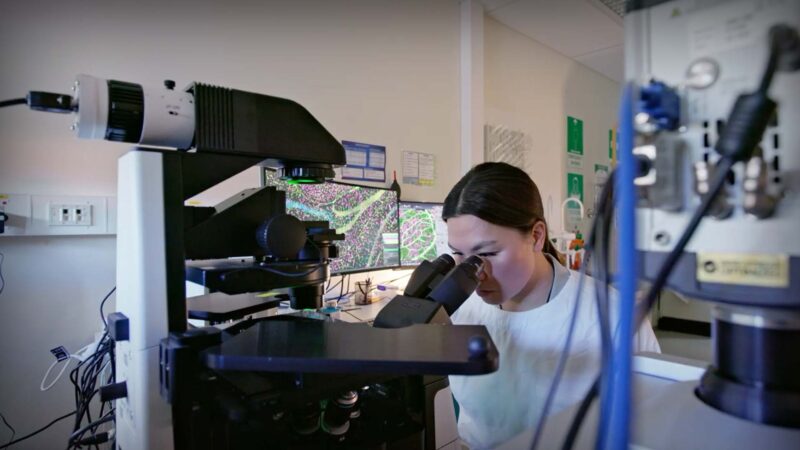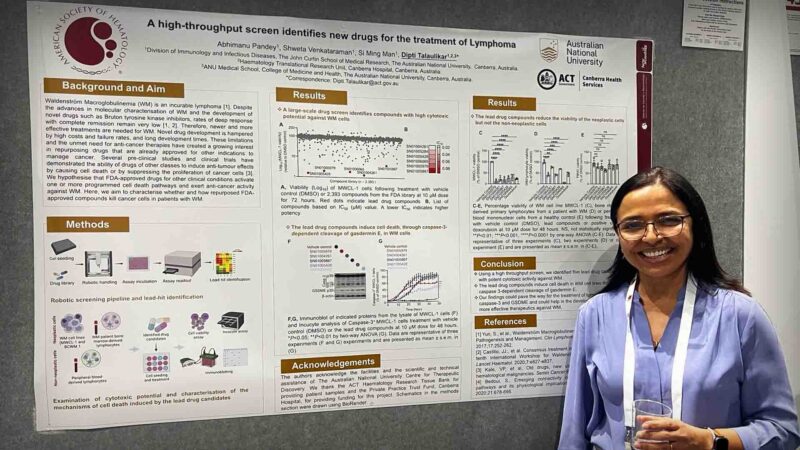ASSOCIATION OF SLEEP DURATION WITH COGNITION AND VASCULAR BRAIN INJURY MODERATED BY HYPERTENSIVE STATUS High blood pressure and shorter sleep may worsen brain decline: study
With
Dr Stephanie Yiallourou, Senior Research Fellow
Turner Institute for Brain & Mental Health, Monash University
Melbourne, Australia
Associate Professor Matthew Pase
Turner Institute for Brain & Mental Health, Monash University
Melbourne, Australia
CASE STUDY
Filmed in Melbourne, Australia| May 2025
People with high blood pressure who also lack sleep may be at increased risk of reduced cognitive performance and greater brain injury, Monash University research has found.
Published in the Journal of the American Heart Association, researchers assessed whether the combined effect of hypertension and short sleep duration had a negative impact on brain health.
They used data from 682 dementia-free Framingham Heart Study participants who completed overnight sleep recordings, self-reported sleep duration questionnaires, blood pressure and cognitive assessments; 637 underwent brain magnetic resonance imaging (MRI).
In those with high blood pressure, shorter sleep duration was associated with poorer executive functioning and markers of brain injury and accelerated brain ageing on MRI. These associations were not observed in people with normal blood pressure.
These results were similar following adjustment for genetic, clinical and demographic variables.
Insufficient sleep is generally defined as less than seven hours. Participants reported sleeping an average of seven hours per night, with 32 percent reporting a short sleep duration of less than six hours per night.
Moderate to severe obstructive sleep apnoea was identified in 16 per cent of individuals, and almost one‐quarter of the overall sample reported using sleeping pills regularly.
“In individuals with hypertension, shorter sleep duration was associated with worse cognitive performance and greater brain injury,” the study found.
“Inadequate sleep has been linked to hypertension and dementia, and though the underlying mechanisms remain unclear, it is possible that short sleep and hypertension interact to increase the risk of cognitive impairment and vascular brain injury.”
While the cohort was based in the US, researchers believe the results would be similar in Australia.
Senior author Associate Professor Matthew Pase, from the Monash University School of Psychological Sciences and Turner Institute for Brain and Mental Health, said short sleep duration was already associated with an increased risk of cognitive impairment and dementia.
He said while short sleep was associated with elevated blood pressure, the combination of short sleep and hypertension on brain health was unclear before this study.
“These findings have significance, given that over one-third of Australians experience sleep problems,” Associate Professor Pase said. “Importantly, sleep problems and hypertension are treatable. Addressing these factors may offer new opportunities for intervention to improve brain health.”
First author Dr Stephanie Yiallourou, from the Monash University School of Psychological Sciences and Turner Institute for Brain and Mental Health, said screening people with high blood pressure for insufficient sleep could allow tailored therapies to improve brain aging and reduce brain injury.
Dr Yiallourou said they could also be targeted for new randomised controlled trials to determine the efficacy of sleep treatments and blood pressure–lowering therapies in preventing or delaying cognitive impairment.
“The next step in this research is to explore whether the double hit of short sleep and hypertension is associated with dementia risk in the long-term,” she said.
This work was supported by an Alzheimer’s Association Grant.
Source: Monash University Media Release
You Might also like
-
Nutraceutical and pharmacological intervention in neurological disorders
Dr Virginie Lam is a neuroscientist and cerebrovascular biologist with over 15 years of research experience, including more than seven years post-PhD. She co-leads the Neurovascular and Metabolic Diseases Laboratory at the Curtin Medical Research Institute and holds an affiliate appointment at the Perron Institute for Neurological and Translational Science. Her research focuses on the interface between neurovascular health, cognitive function, and therapeutic translation in neurodegenerative disorders.
-
Lymphoma, Myeloma and Genomics
Professor Dipti Talaulikar is a clinical and laboratory haematologist with expertise in genomics, working at Canberra Health Services, and Professor at ANU. She has a clinical and research interest in lymphoma, myeloma and genomics, and has authored close to 100 peer reviewed papers, including several clinical guidelines that have had a significant impact on clinical practice.
-
Life-changing donor milk for preterm babies
Dr Laura Klein is National Milk Research Leader at Australian Red Cross Lifeblood. Australian Red Cross Lifeblood is funded by Australian governments to provide life-giving blood, plasma, and transplantation and biological products.
Dr Klein works with clinicians and researchers across Australia to understand how donated breast milk can be used to improve outcomes for vulnerable babies. She’s passionate about generating evidence to improve the products and services that milk banks provide to donors and the families who receive donated breast milk.



